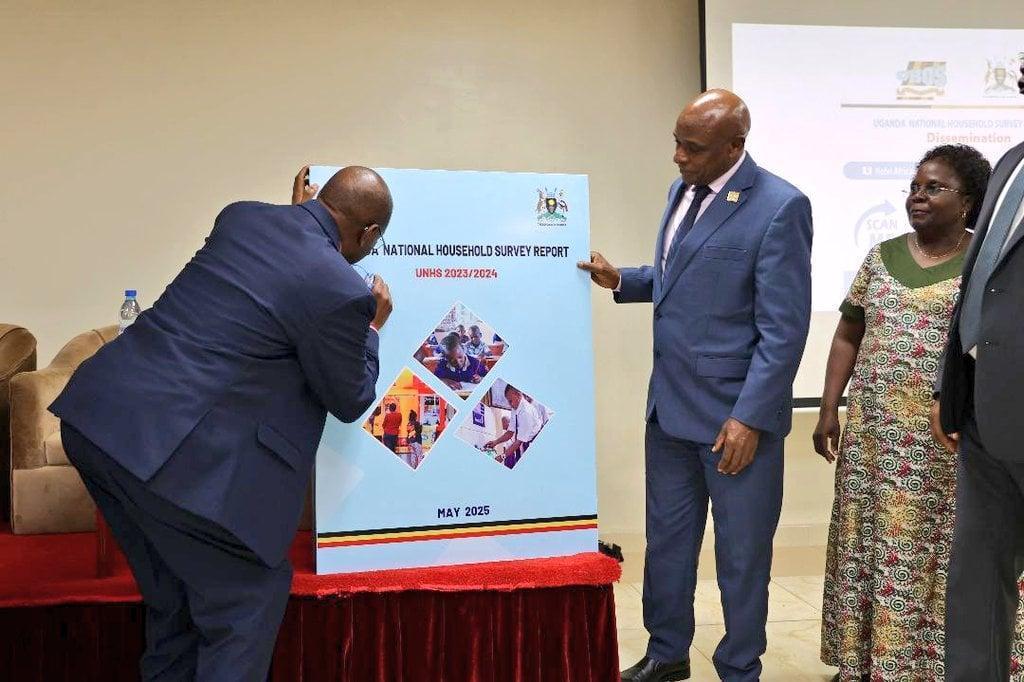Africa-Press – Uganda. Uganda’s poverty levels have dropped to 16.1% in 2023/24, down from 20.3% in 2019/20, according to the Uganda National Household Survey (UNHS).
The report was released by UBOS on Thursday, marking the lowest poverty rate recorded in decades.
This notable reduction is largely credited to government interventions such as the Parish Development Model (PDM) and Emyooga, aimed at transforming the livelihoods of rural communities.
The report was officially launched by Amos Lugoloobi, Minister of State for Finance, Planning and Economic Development (Planning), alongside Dr. Chris N. Mukiza, Executive Director and Chief Statistician at the Uganda Bureau of Statistics (UBOS), and other senior government officials.
“This decline is a clear signal that our anti-poverty programs are yielding results,” Lugoloobi said. “However, there is an urgent need to focus efforts on regions where poverty remains alarmingly high.”
Despite national progress, poverty remains disproportionately high in rural areas, with 19.4% of the rural population living in poverty, compared to 10.3% in urban settings.
Karamoja continues to be the hardest-hit region, with 74.2% of its population approximately 937,500 people living in poverty.
This figure is nearly five times the national average, and a significant rise from 65% reported in the previous survey.
Other regions with persistently high poverty levels include:
• Bukedi: 29.9% (718,400 people)
• Teso: 29.8% (709,100 people)
In contrast, Kampala registered the lowest poverty rate at just 1.1%, equating to about 19,200 individuals.
Lugoloobi emphasized the importance of tailored strategies.
“In order to move every Ugandan from a peasant lifestyle to the money economy, the government of Uganda is still dedicated to fulfilling Vision 2040. This goal cannot be realized without high-quality statistical data that measures our performance and identifies the gaps.”
Joseph Enyimu, Commissioner for Economic Development, Policy and Research at the Ministry of Finance speaking on behalf of the Permanent Secretary/Secretary to the Treasury commended UBOS for its role in producing timely, policy-relevant data.
“The UNHS is a continental benchmark, essential for accountability, planning, and economic decision-making,” Enyimu noted.
He also warned of rising food prices in urban areas, which could offset income gains for many households.
The survey revealed that agriculture remains the dominant source of employment, especially in rural areas, employing 55% of workers.
In urban centers, employment is more diversified, with 47.3% working in the services sector and 12.6% in industry.
Access to healthcare has also improved, with 82% of those who fell ill seeking medical attention. Among the 12% who did not seek treatment, 46.9% cited mild illness while 15.7% were hindered by lack of funds.
Private clinics remain the most preferred healthcare option, serving 54% of patients, followed by government facilities at 27%.
Encouragingly, 86% of households are now located within five kilometers of a health facility, suggesting improved accessibility.
The report recommends increased investment in rural education, healthcare, and job creation to ensure that the gains in poverty reduction are sustained and more equitably distributed.
Experts such as Sarah Ssewanyana, Executive Director of the Economic Policy Research Centre (EPRC), and Joseph Enyimu reiterated the need for targeted social interventions, especially in lagging regions like Karamoja, to prevent them from falling further behind.
“This report offers a roadmap for policymakers to prioritize and tailor programs where they are needed most,” Ssewanyana said.
As Uganda celebrates the progress made, the emphasis now shifts to inclusive development, ensuring that no region or community is left behind in the journey toward prosperity.
For More News And Analysis About Uganda Follow Africa-Press






